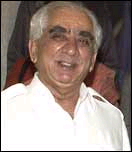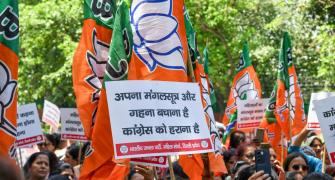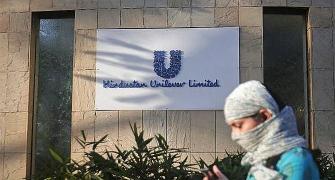 Finance Minister Jaswant Singh chose a newly refurbished hall in North Block to defend his announcements in a post-interim Budget interview.
Finance Minister Jaswant Singh chose a newly refurbished hall in North Block to defend his announcements in a post-interim Budget interview.
The markets have not reacted positively. Why do you think the stockmarket index fell?
I do not know if that should be the index of judging any Budget. I endeavour not to comment on the market reaction. The fundamentals of the economy continue to be strong as I mentioned in the speech. In fact, there is no reason for anybody to draw an adverse inference from the market movements.
Bank scrips have fared particularly poorly. Has it got to do with Tuesday's announcements, which suggested they would be lending at lower interest rates?
We are not going back to any kind of administered rates. There is an imbalance in the structure of credit in the economy. While manufacturing units have access to finance at 4-5 per cent interest, no one in the farm community is able to access credit at less than 14 per cent.
Given that 75 per cent of the country is rural and that agriculture's contribution to the GDP is about 25 per cent, India cannot afford to not pay heed to this sector. It is relevant in both economic and social terms. We are not forcing banks to do this. We are only advocating a certain approach. Banks can well multiply their funds, it is commercial activity for them.
What about the sunset clauses for exempting export profits, fiscal incentives for Jammu & Kashmir?
Exports must also move away from the crutches of state support. The clauses were introduced to serve a purpose. The Finance Bill takes care of them. If anything is inadvertently left out, we will take care of it.
Obviously, I cannot change the direct tax rates. It will be unwise to specify rates at this point.
How did you manage the sharp reduction in the fiscal deficit to 4.8 per cent of the GDP for the current fiscal?
There is no jadoo in it. It is a reality, and moreover it is based on a conservative estimate of GDP growth. I have also said that we would move to 4.4 per cent of GDP in the next fiscal. For the first time, there is revenue buoyancy without any additional revenue mobilisation measures. The tax-GDP ratio has now surged to 9.5 per cent.
Yes, my expectations on personal income tax and excise duty collections have not been met. I am addressing it. As far as personal income tax is concerned, the base has not expanded, and in excise there is always a lag between reforms and beneficial consequences.
Despite this being an election year, you have projected an increase of expenditure of less than 6 per cent, excluding the state debt swap. Will you be able to manage?
Without doubt. In volume terms, expenditure management has resulted in savings of Rs 11,000 crore (Rs 110 billion) despite spending more money on schemes like the Sarva Shiksha Abhiyaan and Delhi Metro. In fact, non-Plan expenditure has risen only 2 per cent while Plan expenditure has gone up by 11 per cent.
Subsidies on food, fertilisers and petroleum have been rationalised and have increased by only 1 per cent as against 20 per cent in 2002-03. Interest payments have also gone up only 5 per cent against 6.5 per cent in 2002-03.
Allocation to physical infrastructure has increased by 19 per cent as against 5 per cent last year. For social infrastructure, it has gone up by 12 per cent.
With the exception of rural development, expenditure has been cut in almost all areas. Are the savings because of expenditure management or because of non-utilisation of funds allocated to ministries?
Last year, we had asked ministries, including the department of human resource development, if they were ready for quarterly assessment of expenditure needs. This year, we hope to extend it to other ministries.
Don't you think the move to merge 50 per cent of the DA of central government employees with the basic pay will prompt states to follow suit, resulting in a worsening of their finances?
I accept it will have a consequence should states follow suit. This was part of the recommendations of the Fifth Pay Commission. There are, of course, fiscal consequences. Looking at the other side, government employees also contribute to the growth of the economy. Why should they be denied the benefits? Their real income needs to be preserved. Compared to income levels in the private sector, a mismatch is evident.
Almost 60 per cent of the total wage bill is for pensions. For senior citizens, the difficulties are manifold. The interest rate is falling and there are fewer avenues for investment. How do I help them lead a life of relative dignity? In reality, I am buttressing the real pension of the old and senior citizens. A part of it, of course, comes back as taxes.
We will absorb the dent fully. There are not easy decisions to take. I have to choose between two equally valid and competing arguments.
What role do you exactly envisage for IDBI? Will it go back to development financing?
There is a need for development finance in the country. IDBI will be the central agency for development finance. A consortium can come into being for infrastructure funding. It is a facility being created. Who will manage it? IDBI, IDFC, LIC and SBI.
Similarly, Nabard becomes the lead agency for agriculture credit and Sidbi for small and medium enterprises. The intention is that the various funds should not be managed by the finance ministry. They must be professionally managed and at arm's length from the ministry.







